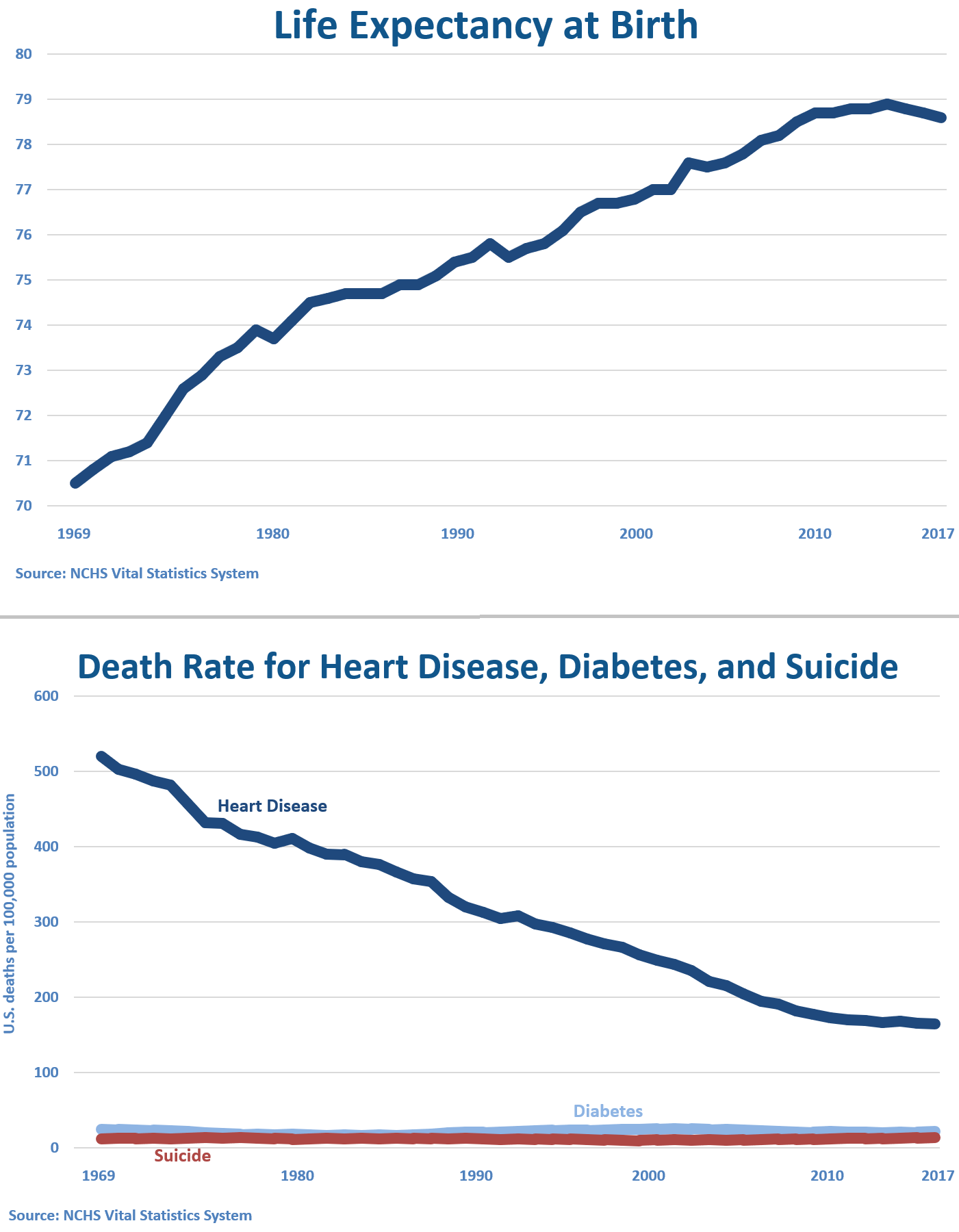
The Real Story of Declining U.S. Life Expectancy
 The headlines are full of it. “Drug overdoses and suicides are causing American life expectancy to drop,” says the Atlantic, for example.
The headlines are full of it. “Drug overdoses and suicides are causing American life expectancy to drop,” says the Atlantic, for example.
But the real story is much more complex. Heart disease and obesity are playing a significant role, too.
Big Increases, Small Numbers
Without a doubt, big increases in drug overdoses and suicide are deeply disturbing. As a matter of fact, the death rate for suicide is the highest it’s been since the Great Depression. These statistics paint a picture of a horrible waste of human potential. Thankfully, policymakers are paying attention.
However, they are just one piece of a much larger picture. Zoom out and you see that, even with big increases, these deaths are not the most common. The leading cause of death is heart disease and progress on preventing it has slowed dramatically. Diabetes is number seven on the list. Suicide is number ten, as it has been for many years.
Foreseen More Than a Decade Ago
Back in 2005, a group of distinguished researchers led by Jay Olshansky predicted a drop in life expectancy with an analysis in the New England Journal of Medicine. Co-authors included David Allison and David Ludwig. They wrote:
From our analysis of the effect of obesity on longevity, we conclude that the steady rise in life expectancy during the past two centuries may soon come to an end.
Importantly, they noted the significant potential for obesity to increase the risk of deaths due to heart disease. And indeed, now we can see that the long term trend of reducing the death rate for heart disease may be coming to an end (evident in the graph above).
Now Coming to Pass
Research published earlier this year by Sadiya Khan et al underscores this concern. They showed that people with either obesity or overweight tend to develop heart disease at an earlier age, live more of their lives with heart disease, and therefore die sooner.
So now, we have 71 percent of the population living with excess weight. That puts a large population at risk for years of heart disease and consequently, premature cardiovascular deaths. Thus, it’s not surprising that the long-term trend toward fewer deaths from heart disease has slowed so profoundly. As obesity grows in countries like the UK and Australia, a similar effect on cardiovascular mortality is showing up.
Combine this dynamic with a spike in suicides and drug overdoses and it’s easy to see why life expectancy has dropped now for three consecutive years. Efforts to reverse the disturbing trend in deaths of despair are critically important. But that alone will not allow us to reclaim progress in life expectancy.
Because without reversing impact of obesity on health and life expectancy, we will continue to lose ground. Without better solutions, obesity will be taking an even bigger toll on life expectancy in the years ahead.
Click here, here, and here for the relevant reports from CDC. For a rather comprehensive view of these trends from Anne Case and Angus Deaton, click here.
Attorney Reading, painting by Honore Daumier / WikiArt
Subscribe by email to follow the accumulating evidence and observations that shape our view of health, obesity, and policy.
December 3, 2018

December 03, 2018 at 8:38 am, John DiTraglia said:
Deaths from suicide and drug overdoses happen more in young people. Young deaths impact longevity disproportionately.
If the rise in obesity is important why have CVD deaths been declining in tandem with the rise in obesity for so long.
December 03, 2018 at 9:47 am, Ted said:
Good questions, John. Case and Deaton offer some perspective in their paper, as do Olshansky et al.
My simplistic answer would be that for many years, medical care for people with CVD has been improving steadily. Better management of dyslipidemia and hypertension are notable examples. But it seems that rising obesity prevalence is now overwhelming that progress. For a detailed analysis, John, I suggest this paper from PNAS:
December 07, 2018 at 2:36 pm, Joh DiTraglia said:
Ted,
T2D and cholesterol and etc.. obesity correlates are associated with CVD so you would expect longevity impact but it must be small. Also obesity and it’s correlates are not exactly the same animal. Also there’s no treatment for obesity. Being black or poor decreases longevity too….
Remember the report that calculated that the decrease in CVD deaths was about 50% doctor improvements and 50% lifestyle improvements..
thanks for all you guys do